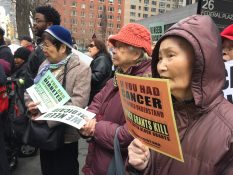I moved into my first apartment in Westchester when I turned 21. I was excited to finally have my own place as I was the youngest of three children growing up in a small house in Bellerose, Queens.
I was diagnosed with Relapsing Remitting Multiple Sclerosis in 2000 and my disease was progressing. The four story walk up I had moved into went from being a fascinating and active home to being a challenging and eventually harmful place to be.
I began to have weakness in my right leg, among other symptoms, and falling became a problem. I fell on my way to my building. I fell going up the stairs and I fell inside my apartment. I was very lucky though: the worst fall I ever had left me with only a concussion, stitches, and a sprained knee.
My doctor advised me that I should seek treatment in a place that was more conducive to treatment to help avoid worsening symptoms. I began seeing doctors in specialized medical centers in Manhattan.
As my condition progressed, I began experiencing challenges commuting. It was difficult taking care of myself because transportation took so much energy from me, not to mention the daily chores that kept getting done poorly or not at all. I hoped to stay in my apartment for a little while more, save some money, and perhaps meet someone to start a family. But the small savings I had quickly diminished from transportation, tuition, and medical bills. I continued on for a few years like that, enduring relapses and then some remissions, but overall, my illnesses continued to progress.
Eventually, I could no longer pay rent and had considerable trouble taking care of myself. It was time to swallow my pride and ask for help before things got worse. I tried talking to others in similar situations in physical therapy or support groups. I went on endless internet searches and even good old fashioned trips to the library. Also, doctors, social workers, and medical staff advised me of other options, but no one, including myself, could fully grasp my medical conditions and ensure a way for me to survive on my own in a stable, safe, and healthy manner for the long term.
At this point, working part time actually made me sicker and never paid enough. My illnesses were variable and getting the right course of action was tricky. I had to apply for benefits.
I sought help from the National Multiple Sclerosis Society, CHOICE of New Rochelle, and other agencies, which were helpful in finding resources, counseling, and advocacy. I graduated from college and lived in my own apartment while dealing with relapses and life in general.
Eventually, a peer referred me to the Center for Independence of the Disabled, New York. CIDNY counselors helped me find updated housing and employment information, maintain proper health insurance, and find affordable, ongoing treatment.
Finding housing during this moment in my life was a huge challenge now that my illness was progressing.
I had to learn so many things to accomplish my goal of remaining independent. I had trouble explaining the details of my situation because I had new symptoms that affected my cognitive functioning. I couldn’t process many things around me effectively, especially when faced with deadlines or long wait times at government agencies.
My counselors learned the details of my situation and how my illness was affecting me. I was advised about proper terminology, programs, employment issues, and an impressive amount of opportunities available to the disabled community. I got excited and thought I could finally get my life on track.
Yet, there were more challenges in finding proper accessible housing, going back to work, and maintaining healthcare while trying to manage an illness.
Deadlines came and challenges were placed in front of me. I had to accept that returning back to work may not be a reality, at least not anytime soon.
After working with counselors who got to know me and my situation, years of forms and filing, something started to click and I learned how to better advocate for myself. I learned about laws that protect disabled people and programs that were becoming available. Most importantly, I learned how to find proper healthcare and housing and take action when appropriate. It took me about six years before I actually got a place that was suitable for me.
I often turned to my counselors and told them I couldn’t do it without them. They would tell me, “You were the one who did the work.”
I still have a way to go on my journey and my illness will continue to progress, but so will my life. Since working with CIDNY and the MS Society, I have married the most loving woman on Earth, improved my diet and exercise routine, found more suitable housing, and, of course, maintained medical treatment.
I’m aware the journey will go on and there will always be more to learn, especially during challenging times, but I know there are good places to rely on for answers and support, and the Center for Independence of the Disabled, New York is definitely one of them.
I still go to the CIDNY offices now. But lately, it’s to get help for my parents, to advocate, or to volunteer—which is one of the greatest kicks of all.



